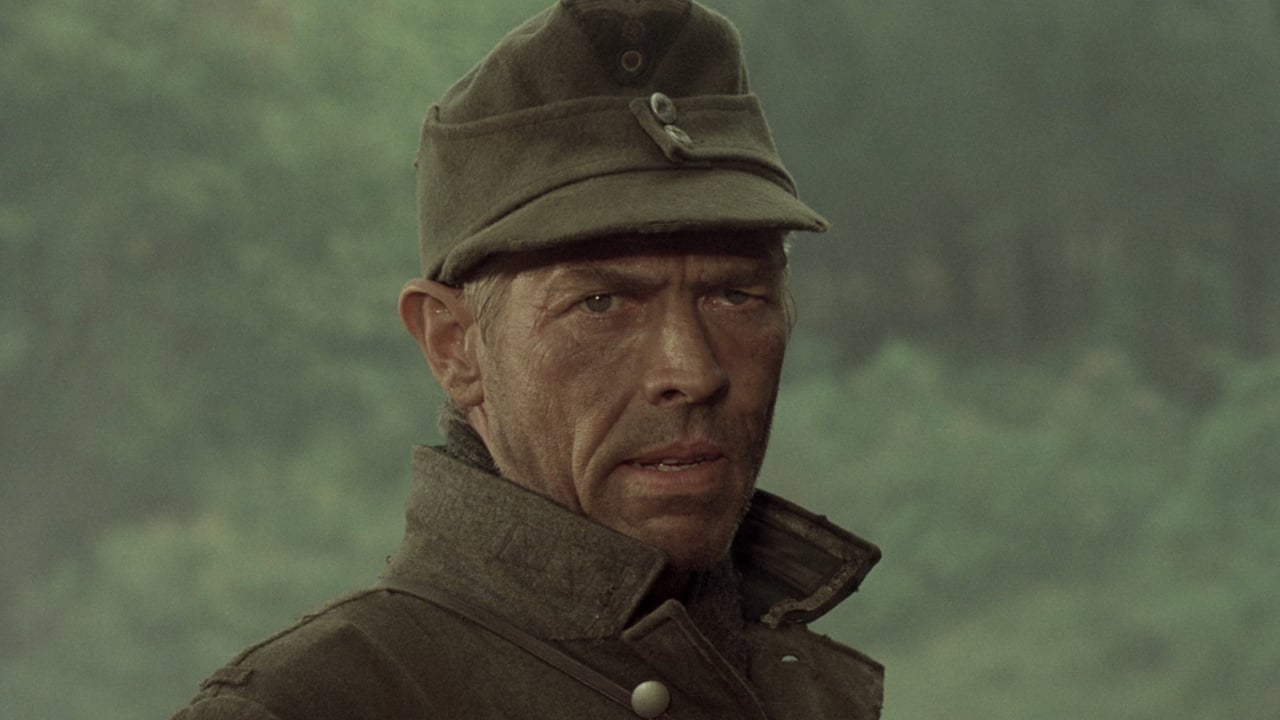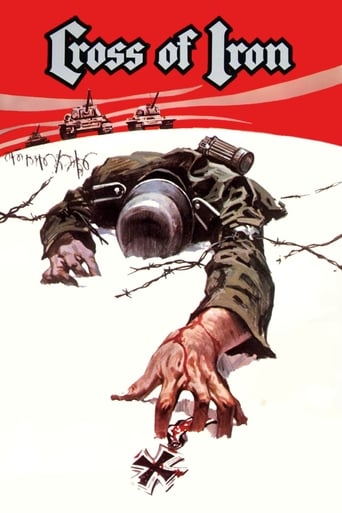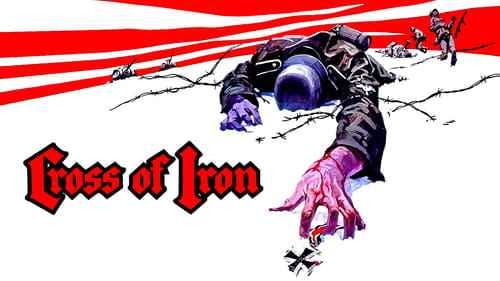



What a waste of my time!!!
Charming and brutal
A Brilliant Conflict
There is definitely an excellent idea hidden in the background of the film. Unfortunately, it's difficult to find it.
View MorePeckinpah's WW2 masterpiece.1943. Stalingrad has fallen and The German Army is being pushed back on the Eastern Front. Nowhere is the situation more dire for the Germans than at the Kuban Bridgehead / Taman Peninsula. Here we see the war through the eyes of a platoon of German reconnaissance troops. Their senior NCO is a grizzled, resourceful veteran, Corporal Steiner (played by James Coburn). He is unconventional, insubordinate and irreverent, but the regiment's commander, Colonel Brandt (James Mason), tolerates this as he gets results. However, his company has a new commanding officer, the inexperienced Captain Stransky (Maximilian Schell). Stransky is a by-the-book, authoritarian aristocrat and him and Steiner are bound to clash. Moreover, Stransky is obsessed with winning the Iron Cross.Directed by Sam Peckingpah (Straw Dogs, The Wild Bunch, Pat Garrett and Billy the Kid), this is Peckinpah's Magnum Opus. Very gritty and realistic portrayal of war. Shows perfectly the chaos, terror and desperation of battle - the perfect maelstrom of war. Through the characters we see the different soldiers you meet in a war - the tough, resourceful ones, the political operators, the fanatics, the scared recruits, the paranoid ones, the realists. This gives a great insight into how different people, even on the same side and in the same unit, can view the same war. These characters also provide a commentary on war - it's pointlessness, hopelessness and wastefulness. Peckinpah rams this home with some very tense and graphic battle scenes. His camera work and editing are particularly impressive, conveying well the life-or-death struggle that is being carried out, as well as the randomness of injury and death.Like most Peckinpah movies its a bit rough around the edges. There are some continuity gaps, military inaccuracies and a few plot points aren't entirely sound. However, none of these are major and, if anything, the looseness of the production contributes positively to the movie. The lack of polish adds to the grittiness. Good work by the entire cast. James Coburn is solid as Steiner, as is James Mason as Colonel Brandt. Good support by David Warner as the war-weary, cynical Captain Kiesel. Pick of the bunch is Maximilian Schell who is perfect as the cold, scheming, manipulative Captain Stransky.A classic and one of the greatest war movies ever made.
View MoreCrap. Dynamite and more dynamite, but no real drama. For those who believe that war is like a western, here are their heroes. But war is not. And in this film there is no single historical reference.Does knowing handle explosives to give more "drama" to a movie entitled to replace an effective war story? Why this film is - supposedly- set in Russia during WWII? The filmmakers have simply sought excuses to prove they are capable of using more dynamite that has been used in any other movie.And the drama course is simply stupid, if not entirely child. Admittedly Maximilian Shell makes a very good comic role as the Nazi general in search of his iron cross. But the problem is that the film is not intended to be a comedy. He always tough Coburn, meanwhile, leaves much to be desired as ever when it comes to acting variations. Mason, meanwhile, does a good job in comedy. That's all.
View MoreSam Pekinpaugh has given us a big war-time movie situated on the Russian front, starring James Coburn as the savvy and taciturn Sgt. Steiner and Maximilian Schell as the newly arrived, dapper, Junker aristo, eager for the Iron Cross, the decoration given only for heroism in battle. It has Pekinpaugh's signature on it -- an abundance of painful deaths, more explosions than have ever before been committed to celluloid, and all in slow motion. The story is such that, if it weren't for some cogent lines, it could have been directed by Sam Fuller.I'll give one example of what I thought was a good line. At the end, both Coburn and Schell stand face to face, armed, and about to be overwhelmed and killed by the onrushing Russians. It's only a brief pause, but Schell admits his status still requires the winning of the Iron Cross. "You come with me," says Coburn, "and I'll show you where the crosses of iron are." It's neat because by a simple transposition of words within the phrase, Coburn has turned a medal (the Iron Cross) into a grave marker (crosses of iron). It has its weaknesses. It's really too long and too loose-limbed for what it has to say. As Steiner, Coburn is a monument to military perfection, while Schell is a stereotypical cowardly and spiteful traitor. Coburn does well enough by the role of the humanitarian but dedicated sergeant. Schell is a marvelous actor but he has only one scene in which he's able to put his chops on display -- when he tricks a subordinate into admitting that he prefers the company of men to women. "He said YES! He said YES!" Schell is in a transport of delight at having finagled his subordinate into a possible admission of homosexuality which, as far as we can tell, isn't true. The effect, though, is to make the subordinate a compliant slave.It's not a bad film in any way but it lacks poetry of any kind. Pekinpah by this time in his career was describing himself as "a functioning alcoholic." He's lucky he got it out at all.
View MoreI had been aware of this film but it wasn't until recently I purchased it on DVD. Others have noted its similarities in some respects to Stalingrad, but I feel CoI is a superior film. The acting is sharper and we are presented with a range of characters all with different views and attitudes to why they are on the Eastern front, and what they hope to achieve be it glory, sanity or to just survive and get the hell out of there. All of the lead and support actors are very good in their roles, and it is possible this is Coburns best. The villain of the piece here of course is the vain glorious Prussian aristocrat who seeks the Iron Cross for purely personal yet family reasons. He needs to return home as the hero and patriarch and is quite happy to betray the ordinary soldier to obtain his lofty aims. Yet he hates the Nazi's and the 'little corporal and failed painter'. He clearly sees that regardless of how the war ends it will be his class that will eventually rule Germany. The Iron Cross will just be a trophy of his superiority. A good bookend to Stalingrad but IMHO a somewhat more satisfying film.
View More